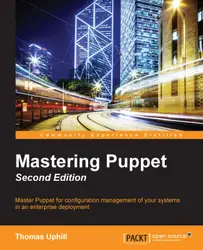Write custom plugins for Puppet, including facts, providers, and functions
Key FeaturesGrasp recipes that work with centralized and decentralized deploymentsExplore language differences and enhancements anticipated in Puppet version 5.xGain expert understanding of Puppet's latest and most advanced featuresBook Description
Puppet is a configuration management system that automates all your IT configurations, giving you control of managing each node. Puppet 5 Cookbook will take you through Puppet's latest and most advanced features, including Docker containers, Hiera, and AWS Cloud Orchestration. Updated with the latest advancements and best practices, this book delves into various aspects of writing good Puppet code, which includes using Puppet community style, checking your manifests with puppet-lint, and learning community best practices with an emphasis on real-world implementation.
You will learn to set up, install, and create your first manifests with version control, and also learn about various sysadmin tasks, including managing configuration files, using Augeas, and generating files from snippets and templates. As the book progresses, you'll explore virtual resources and use Puppet's resource scheduling and auditing features. In the concluding chapters, you'll walk through managing applications and writing your own resource types, providers, and external node classifiers.
By the end of this book, you will have learned to report, log, and debug your system.
What you will learnDiscover the latest and most advanced features of PuppetMaster techniques to deal with centralized and decentralized Puppet deploymentsUse exported resources and forge modules to configure and deploy applicationsCreate efficient manifests to streamline your deploymentsAutomate deployment of puppet environment using git-hooksDeploy AWS instances and Docker containers with PuppetMake Puppet reliable, performant, and scalableWho this book is for
Puppet 5 Cookbook is for anyone who builds and administers servers, especially in a web operations context. You’ll need some experience of Linux systems administration, including familiarity with the command line, filesystem, and text editing. No prior programming experience is required.
Thomas Uphill is an RHCA who has been using Puppet since version 0.24. He has been a system administrator for nearly 20 years, more than 10 of which have been with Red Hat Linux and its derivatives. He has presented tutorials on Puppet at LISA and has spoken at PuppetConf. He enjoys teaching others how to use Puppet to automate as much system administration tasks as possible.


